Hello everyone. Happy Monday.
Here are the most notable news items our community came across in the past seven days…
Grandmas who ride: A group of Canadian women called “Victoria Grandmothers for Africa” completed a 280 kilometer bike ride to raise money for kids who’ve been orphaned by HIV/Aids. (Saanich News)
She did it! American endurance cyclist Lael Wilcox completed an around-the-world bicycle ride in record time (108 days with a daily average mileage of 174 miles) and set the cycling world abuzz with her inspiring attitude. (Cycling News)
New rules proposed for big vehicles: Safety advocates are very pleased that the federal government is poised to make a big upgrade to its vehicle safety regulations with the expressed intent to improve safety of people outside them. (NPR)
How to not stop speeding: An effort to require carmakers to install audio warnings when people drive over the speed limit seems destined for the dustbin because government regulators are worried about whether drivers will like it or not. (Washington Post)
We are infected too: Surprise, surprise! Motonormativity, aka “being car-brained” is a very prevalent condition here in the United States and it’s a major barrier to making progress for non-drivers. (Streetsblog USA)
Cars are the problem: “One of the few predictions that I feel very confident in is that, a century or so down the road, people will look at modern car-centric America with the same disgust that we feel when we hear about old timey cities without modern sewage systems.” (How Things Work)
Marginal gains in the sack: The latest front in pro cycling’s pursuit of speed centers around not moving at all. Here’s what the pros are doing to get a solid night of sleep. (Velo)
Parking restrictions: The University of Portland has tightened their parking permit system amid a reduction in car spaces as they try to meet city transportation goals. (UP Beacon)
Thanks to everyone who sent in links this week. The Monday Roundup is a community effort, so please feel free to send us any great stories you come across.



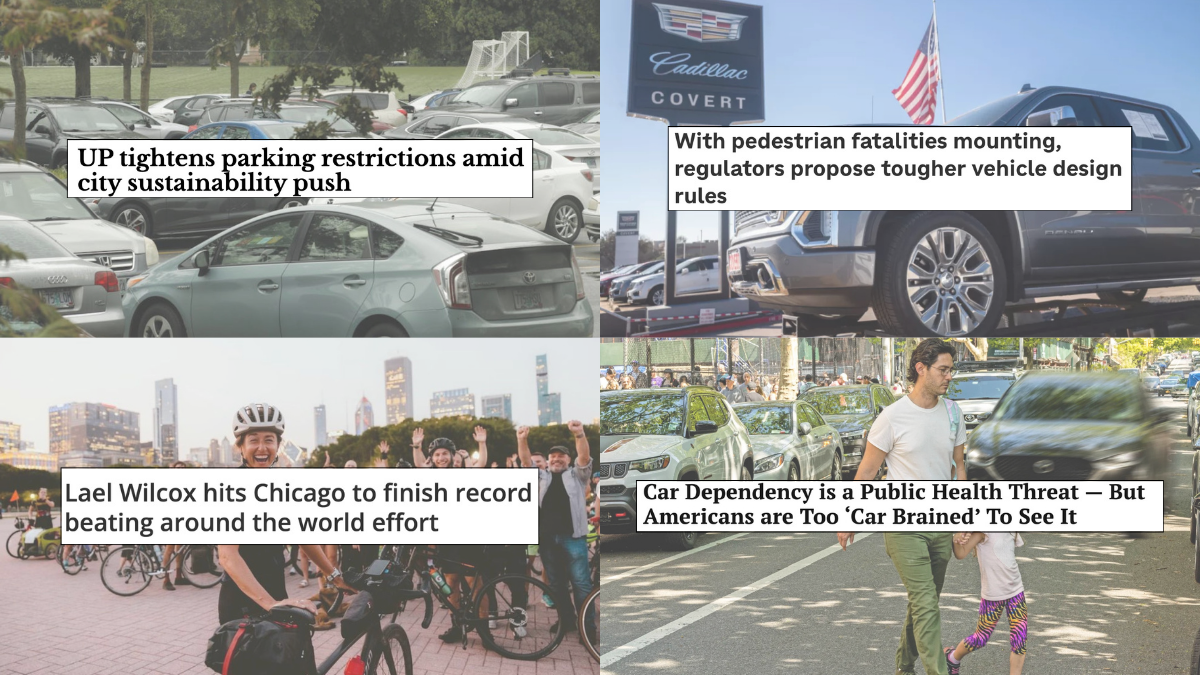
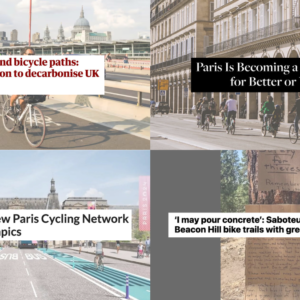
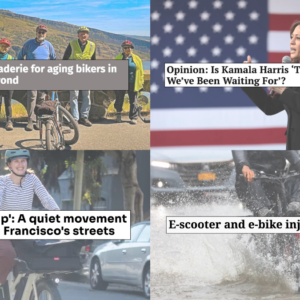
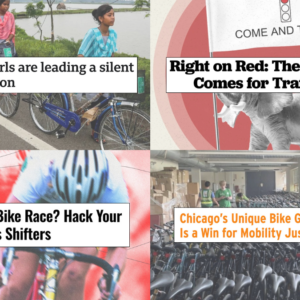
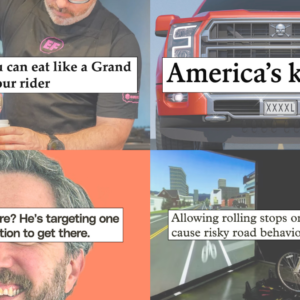
Thanks for reading.
BikePortland has served this community with independent community journalism since 2005. We rely on subscriptions from readers like you to survive. Your financial support is vital in keeping this valuable resource alive and well.
Please subscribe today to strengthen and expand our work.
Car emissions apologia is also common among people who bike. The tail-pipe emissions that we huff on our bike rides will cause some of use to die early and to suffer immensely but the response from the cycling community to this fact is mostly a shrug. Tail-pipe emissions morbidity/mortality also makes the ubiquitous denial of the utility of vehicle electrification in the cycling community incredibly short-sighted and kind of narcissistic.
I’ve never seen anyone seriously say that EV transition wouldn’t be a positive on the tailpipe emissions front. I do often see that it’s not the most important thing, and that our investments will be sort of in vain if there aren’t strong investments in changes to land use and other cultural norms around driving.
And I think that’s true – spending like $1 trillion on electrifying the automotive fleet is money not spent on other changes that could be more impactful. EV transition solves one problem – tailpipe emissions from ICE cars – while investing in public transit and changing land uses can solve more than one problem. But almost all of our money is being spent to do tax credits for EVs, rather than investing in other proven no carbon modes of transportation.
EVs will be very beneficial here; tire particulates may increase a bit, but tailpipe emissions will be zero, and braking related emissions will be much lower due to regenerative braking. And noise emissions should be much lower as well (especially for trucks).
How would you reduce emissions more quickly if you could redirect EV tax credit money? If you say “better transit”, please include how you plan to get enough people to ride it that emissions actually drop. Whatever we do, the solution needs to be humming along in 10-20 years, with a big chunk done sooner.
Are there other solutions queued up and ready to go the way EVs are?
Nah…we just need to implement a land value tax and completely deregulate real-estate markets. In 75-150 years real estate speculators might produce enough dense urban housing for those who can afford in a +3 C hellhouse world.
“a +3 C hellhouse world“
We already have a decent part of the world like that, it’s the Middle East and North Africa. When those conditions start happening in decadent and utterly unprepared North America, we’ll all begin to appreciate firsthand why that part of the world is in perpetual drama, it’s the constant misery suffered by the people. Meanwhile, people argue the merits of EV vs ICE vehicles instead of actual remediation such as preparing neighborhood wells, clean water plants for using the Willamette, extreme shade tree planting on steroids, seed bunkers, learning to farm and animal husbandry, etc.
Like Phoenix?
Not quite like Phoenix. Phoenix, Vegas,Tucson and other hot cities still benefit from a functioning power grid and there is still plenty of food available even if it has to be stolen. Gasoline (or charging stations) is available and there are places to be traveled to that are cooler.
I believe you’ve been to the ME/NA so you’ve experienced the flying dirt, the flying sand and the airborne fecal materials due to not enough plumbing (not enough water) without any hope of air conditioning, excess calories or trees to shelter from the sun. It’s the lack of respite from harsh conditions that we’re not used too and will be what makes thing spicy soon after the grid collapses due to increased climate crises.
If we are going to have any type of EV subsidy, one targeting plug-in hybrids would be a more effective way to reduce urban particulate emissions. I’d rather see 10 plug-in hybrids on the city streets with a 25 mile all electric range, than a single Tesla with a 250 mile range.
If one wants to truly prevent premature deaths from particulate emissions globally, then don’t even worry about transportation and instead invest in making clean cooking fuel (ie, propane) widely available in the developing world.
Braking related emissions (particulates) will be much higher due to the increased weight of typical EVs. And that increase in weight also mitigates any road noise gains, as at higher speeds it’s all tire noise anyways.
Tax credits for EVs are expensive, and in my opinion not an urgent way to solve an issue. They rely on people both being in the position to buy a new car and wanting a current EV on the market. People replace cars ~every 12 years on average (and rising), so targeted subsidy to new purchases required at least 2 decades to really reach a critical mass. It’s also going to cost on the order of $18B just in the Portland metro area. For that kind of money, we could build an entirely new rail transit network (it’s less than the cost of the current MAX network adjusted for inflation). But the fastest way to displace car trips in favor of transit would cost far less – just more buses and bus lanes. An hour of bus operations costs TriMet ~$140, so $500M/year for 20 years would be more than double existing service and would still leave $8B for capital projects to improve service further. And ridership does follow service – you can see this in TriMet’s reports where the highest bus ridership years (08 and 09) correspond to the highest service years as well.
Obviously, the federal government would have to seriously change its tune here to both directly subsidize bus service (currently not really allowed) and to not favor car stuff (not very politically feasible).
EVs are “ready to go” only for a subset of drivers, and only up to a point. They are still generally expensive for the average consumer and still represent less than 10% of new car sales. Even with governments attempting to subsidize on price both for suppliers and consumers we are still looking at many decades before anything close to mass adoption. Meanwhile, the federal government has never invested more in mass transit than it has in highways. Highways got a $500B head start, and the gap grows every year; so why do we act like it’s some shock that ridership is anemic in most of the country? It would be incredibly easy administratively to boost transit ridership by a huge influx of cash to the industry – much easier than it is to get people to buy an EV car
For hard stops EVs may emit more brake particulates, but for everything else there’s regen braking (which emits none). Tire noise is much less disruptive in an urban setting (in my opinion) than engine noise, especially for trucks.
Your assertion that more buses would result in lower emissions than electrifying private vehicles is untested. People would need to ride those buses, and, as far as I can see, they’re telling us they don’t want to.
All that said, if a rigorous analysis showed that more buses would be a more effective way to spend our money to mitigate climate change, I’d support it.
What would convince you that subsidizing EVs is the better policy choice?
PS If getting more people on transit would be “incredibly easy,” why isn’t any American government doing that? Maybe it isn’t quite so easy.
=-=-=-=-=
Lots of authoritative sounding info about EV brakes here, some of which was new to me:
https://www.rac.co.uk/drive/electric-cars/running/do-electric-vehicles-produce-more-tyre-and-brake-pollution-than-petrol-and/
“PS If getting more people on transit would be “incredibly easy,” why isn’t any American government doing that? Maybe it isn’t quite so easy.”
The American government does not care about public transit as a matter of official policy. The FTA only ever subsidized operations in urban areas during the pandemic. Every transit rider in the nation would benefit from increased service level subsidy.
Here’s a paper going into details about the relationship between service and ridership on public transit (https://www.sciencedirect.com/science/article/pii/S0965856421000604). That’s not directly related to emissions per se, but I think it speaks to why more service should be a positive for the climate. If you accept more service -> higher ridership, then it’s obvious that more service is a climate positive. Of course other things are worth investing in too (like higher speeds for service, etc.). Unfortunately for us, service hours and bus speeds have been declining for years in Portland
“What would convince you that subsidizing EVs is the better policy choice?”
The problem with current EV subsidy is largely that it’s inefficient and poorly structured. It does not make EVs affordable to the segment of the population with the lowest ability to pay (and likely the oldest and worst performing cars for emissions). Additionally, without any significant regulatory move to force the hand of consumers and producers, there’s no reason to expect EV market share to improve dramatically. And anything less than 50% means the problem isn’t getting better imo. A better system would be to specifically target low income households that own old cars with full cost EV vouchers, rather than give everyone the tax credit option. I’m not certain this applies to the EV credit but the tax credit route also favors people with more capital who can front the cost before getting it back later on taxes.
On regen braking: any time the brake pads engage, excess tire wear happens since the wheels have need to exert the force to slow to vehicle down. I would assume this is most braking situations. Of course, some of the energy can be redirected as this happens into charging the battery, but never all of it (outside of coasting downhill – but that’s obviously different). There’s also increased wear from accelerating to consider as well, plus the other negatives of heavier vehicles on road wear and pedestrian fatalities (a bit off topic, I know).
That’s not true; if I run 2x as many diesel buses of the type TriMet can’t quit, and get 50% more riders, it’s likely to be a net loss (just making numbers up, but you see the reasoning). Alternatively, if TriMet cut all the low ridership bus lines in Portland, removing 50% of the vehicles but only losing 25% of the passengers, that would probably also be a net positive climate-wise. So no, it’s not at all obvious that more service is climate positive. In fact, it’s obviously false as a general statement (even if true in some specific cases).
What you need to do is increase passengers/vehicle far enough beyond the passenger/vehicle breakeven point to justify the cost. It’s not at all clear to me there is a way to do that while meeting all the real world constraints we have to contend with. If TriMet knew how to do it, they’d have done it.
Regarding what it would take to convince you EV subsidies are a good expenditure of money, are you saying that if they were restructured in a way you thought was more efficient, you’d be on board?
Finally, on regen braking, the article I sent noted EV brakes wear less quickly than gas car brakes, and tires about equally in practice. If that observation is generalizable, I don’t know what more there is to say. I’ll take real world observation over theoretical pontificating any day. Especially interesting (to me) is reduced use of brakes allowed some to be converted to drum brakes which, as a happy side effect, capture brake dust.
Your heuristic may be true of a single line, but the network effects and how each line relies on each other for feeder service makes things much less clear in reality. Additionally, the emissions of running additional bus service should be weighed against the likely alternative (driving) rather than the efficiency of existing routes.
I’m not against EV subsidies per se, but yeah I think most of the issues now are with implementation more than in spirit.
And yes, the inherent benefits of EV cars are good (of which regen braking is one – since running an electric motor in reverse charges batteries), but I’ve read the opposite on increased tire wear in practice, especially for heavy EVs. I like pontificating about theory like this, but then again I studied physics in undergrad
Until we electrify diesel-powered transit (tolley+BEV), it’s also part of the air toxic problem.
A well operated diesel bus network would displace more emissions than it would create, at least in most US cities where cars make up the vast majority of trips. Buses are much more efficient at moving lots of people than cars
First of all, diesel emissions generate far more particulates and air toxics (NOx) than gasoline.
https://www.oregon.gov/deq/aq/programs/pages/diesel-health-effects.aspx
Secondly, since we don’t live in a NUMTOT mass transit utopia, it’s important to consider that the low usage of Portland’s mass transit system makes transit a high GHG-emissions mode. I wish this were not the case but decarbonization is such a moral imperative that electrification of mode share as it exists now should be our priority.
Portland’s low transit ridership is a result of a combination of poor choices by the agency and unfavorable federal policy to transit in general. Both of those are solvable problems.
Does one FX2 bus filled with 50 people emit more or less than 50 typical cars traveling the same distance? The Nova LFS Artic buses have a Cummins L9 engine rated for the EPA’s 2017 regs and get like 15 mpg from what I can tell. Even if we take into account the higher levels of particulate emissions, I have a hard time believing it’s 50x worse than a comparable age car.
Does one #70 bus filled with zero people emit more or less than no cars traveling the same distance?
Maybe the answer is TriMet should be choosier about where it operates bus service. The FX2 makes sense. Other lines, perhaps less so.
I know this isn’t the point, but I don’t think I’ve seen an empty #70 any time I’ve ridden it this year (something like 70 rides so far).
Buses are sometimes empty for segments, but cutting service in the network means making service worse for the region in general. I ride the FX2 occasionally, but I’d ride it more if the #70 had more frequency and connections were more convenient.
TriMet has cut service on its bus network consistently since peak ridership in 2009. More cuts will not increase ridership.
Only if they’re full. I see empty or nearly empty TriMet buses driving around all the time. An empty bus is much less efficient than just doing nothing.
TriMet needs to get their ridership/vehicle up. I’m willing to bet there are many lines that are less efficient at moving people than cars (especially EVs) would be.
Ridership/vehicle is a bad metric to judge anything other than farebox recovery of a transit network. Sure, routed can be changed if no one ever rides, but that’s extremely rare from what I’ve seen while actually riding the system. I ride all sorts of routes all over town and very rarely am alone on the bus.
Raw trips, or trips per capita are much better goals to shoot for. Some routes need to exist for coverage for riders who don’t live close to high performance routes. Sometimes a bus is empty because of random chance. Sometimes a bus is empty because TriMet did a poor job of designing its route.
People shrug about things that they can’t control. Tailpipe emissions are controlled mostly Federally, via Federal emissions rules for new vehicles.
At a local level, we can elect officials to add county and State-level emissions rules, but you can’t block out of state drivers from driving through our state and city. Most counties in Oregon have no DEQ testing requirements. We can’t control emissions policies in Washington state.
The single best thing we could do would be to ban all 2-stroke scooters, but a ban like that would be hard to enforce and probably would be ruled unconstitutional knowing the current makeup of the Supreme Court.
*shrug*
But, but, that might be the only thing minorities/poor can afford! We couldn’t ask them to make that ultimate sacrafice.
Perhaps we could offer a subsidy so they could get a cheap third stroke.
Where in the US, or globally for that matter, is any two-stoke powered transportation still sold, or remaining on the streets, in significant numbers?
https://scooter-stop.com/collections/2-stroke-scooters
I’ve seen a lot of them in Portland, along with DUI special bike retrofits.
https://www.bikeberry.com/collections/bicycle-motor-kits?srsltid=AfmBOoqoAWobNZY2d90OgOu6XneuuyQXTBYlYNhhq30H_TgY9tQB77uB
If you’re hardcore you’ll keep your v brakes 🙂
KTM and Yamaha still sale 2 stroke motorcycles. KTMs are Euro 5 compliant. This makes them legal to ride off-road in California under their new rules.
Go Lael! Hell yeah!